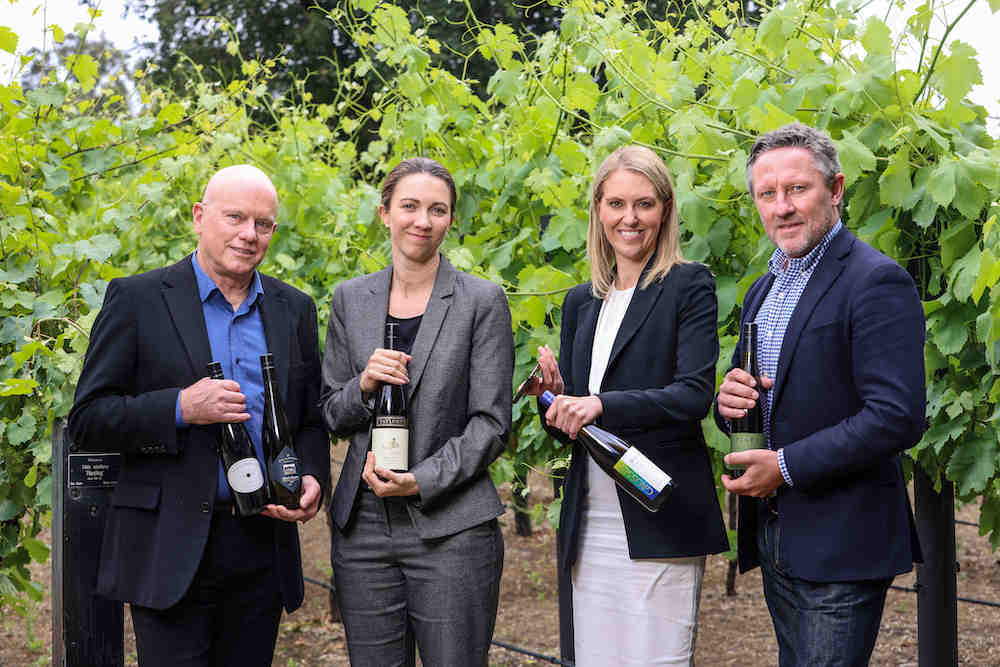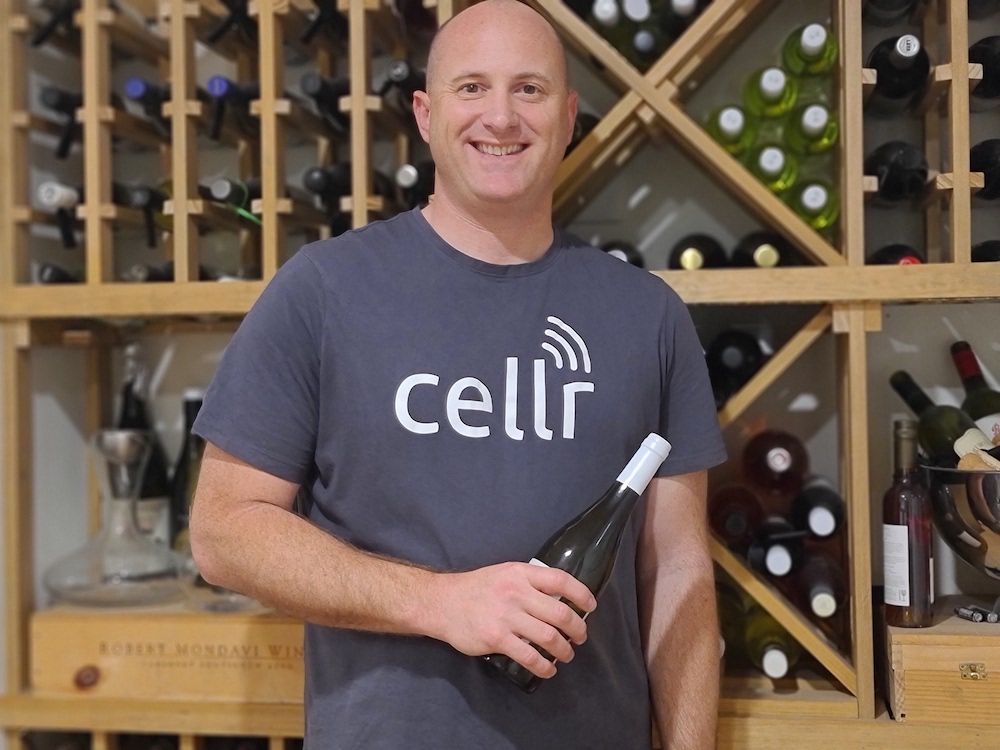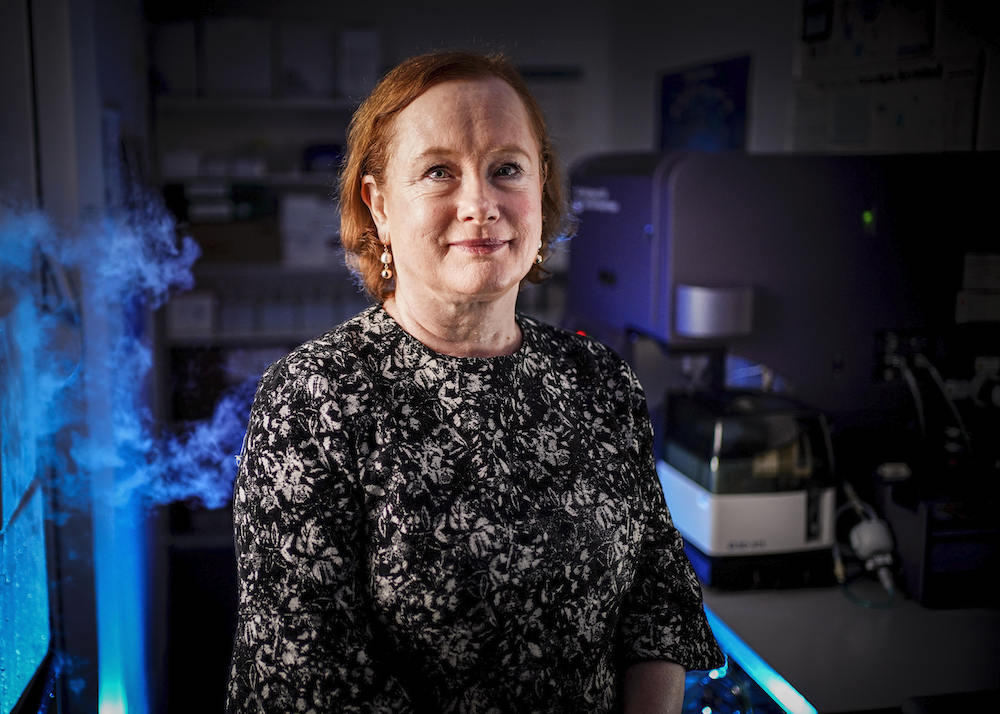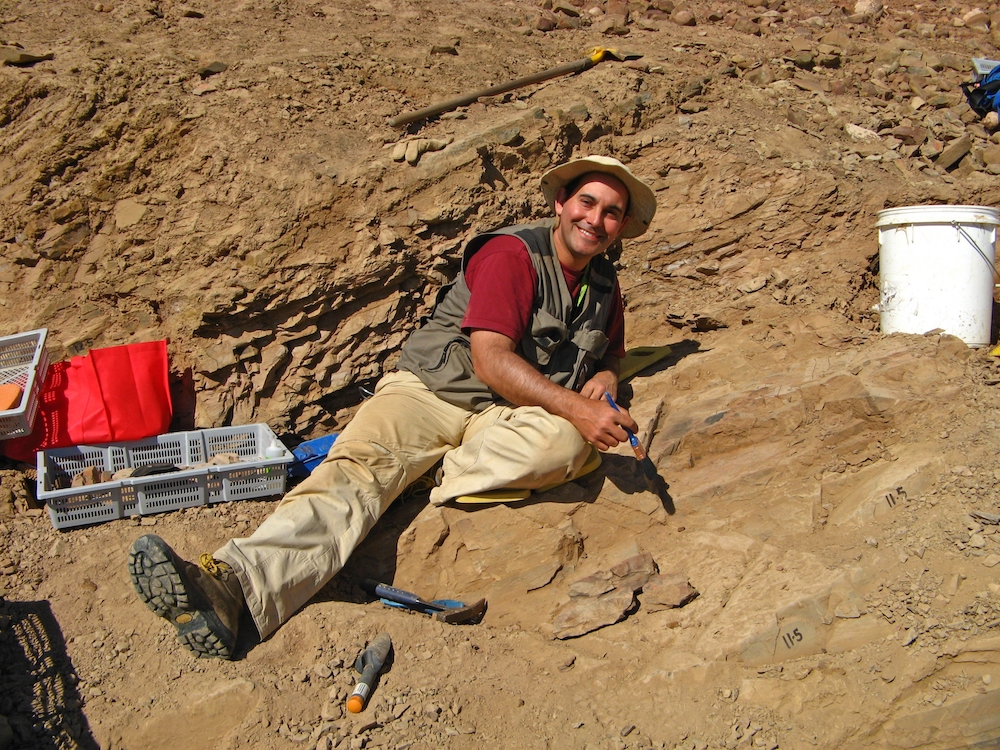WINE
RECORDING THE FUTURE
Technology and tradition are joining forces to protect one of South Australia’s most prestigious industries
South Australia has established a global reputation for producing some of the world’s most respected fine wines. It’s a reputation the state’s premium winegrowers are deservedly proud of – but one that is under threat. Counterfeit wine is big business. In China alone, it is estimated that more than 40 per cent of all wine sold is fake, with fraudsters swapping out labels for those of premium producers. Experts estimate that, by 2022, this scam will cost the global wine industry more than $4 trillion. It’s also happening here in Australia. Late last year, 600 tonnes of Langhorne Creek shiraz was taken to the Barossa Valley on a series of trucks and passed off as Barossa shiraz, netting the fraudsters a $600,000 profit; while shiraz from the Riverland was also passed off as Barossa shiraz.
These practices have a lasting impact. “It affects the reputation of local winemakers and Australian winemakers, and the Barossa Valley as a brand,” says EnTrust co-founder David Travers. “If you’re having a special event and are buying a really nice bottle and it’s not that wine, then everyone gets ripped off and the consumer loses trust in the product.”
As a fifth-generation farmer in the Clare Valley, Travers understands the importance of preventing fraud and protecting South Australia’s reputation. His family owns a number of vineyards in Clare and has been selling grapes to wine companies including Kilikanoon, Treasury, Penfolds, Hardys and Sevenhill Cellars for 160 years.
Together with Jeff Grosset, owner and founder of Grosset Wines in the Clare Valley who was instrumental in introducing the screw cap to the wine industry more than 20 years ago, Travers in 2019 launched a three-month trial of an innovative technological solution to wine fraud. Backed by $50,000 in prize money as winners of the Premier’s Blockchain Innovation Challenge in Adelaide in March last year, the trial involved embedding supply chain information in the wine bottle’s screw cap which tracks the product every step of the way from vine to bottle to confirm its authenticity.
“We ran the trial from February to April this year and had about 15 companies participating,” Travers says. “We built a small app which allowed wineries to use a smartphone and online platform to follow their produce. We collected about 250,000 litres of wine in various parts of the data set so it gave us the chance to do some analysis.”

The trial proved a success, catching the attention of the dairy and beef industry. Since then, the technology has developed apace. “We started out trying to stop fraud and that is still very much part of our focus – but, under the hood, the engine room of this is about empowering farmers to take control,” Travers says.
That engine room is a new system called Entrust, which the Premier launched in September. The beta technology, which is currently out for testing in the market, features a hashgraph embedded in the lid which timestamps location – helping eliminate not just fraud but also the endless paperwork involved in farming. “Most farmers keep their records in a notepad in the ute glovebox, written on the whiteboard or at the back of the filing cabinet – it’s just a mess,” Travers says. “We‘re working with a hashgraph which is immutable. So if I’m in the vineyard and sending my fruit to Kilikanoon, it records the location I’m in and the time I send it and stores all the information I need in the cloud.”
It’s game-changing technology which can revolutionise the wine industry in South Australia – the only challenge is convincing the old guard to change their ways. “The area of agriculture, especially wine, is so slow to adopt new technology,” Travers says. “My 83-year-old dad has an old Elders’ notepad which is infamous in the farming community. If you explain this is just like that notepad – you just put it all in there and it’s there for you – you can help them to overcome the fear of something they don’t understand. It’s a little barrier they have to get over but once they see how simple it is … ”
While the wine industry mulls it over, the dairy and meat industries have jumped on board. “We’re hoping to do an alpha trial with 15 dairy producers, which is the whole of the dairy industry in South Australia,” Travers says. “They’re keen to be the first in Australia to do it, so we’re hoping we can get that deal up and running before Christmas as well.”
The versatility of the technology in its adaptability to all areas of farming makes it a significant timesaver for busy farmers. “In Clare and other parts of Australia, if you’re a farmer you don’t have one commodity – you might have two or three or five,” Travers says. “If you’re growing grapes in Clare, you’ve probably got hay and grain as well. So the idea is that eventually we’ll create a universal agriculture supply chain software trust, so as a farmer I can sell my products to the market and record everything in my smartphone.”
Travers and Grossett’s standing in the wine industry adds value to the technology. “Jeff has been making wine for 40 years, my family has been farming for more than one-and-a-half centuries here in SA, so we understand the thinking behind it and are just adopting what we do now to this,” Travers says. “We understand it intuitively whereas firms from outside the industry don’t have that knowledge and experience.”
BUSINESS
READY, SET, GO FOR BUSINESS
South Australia offers a range of exciting and innovative ready-made investment opportunities for venture capitalists looking to expand their business portfolio
Exciting new investment opportunities are set to increase South Australia’s global business footprint and secure future prosperity for the state and its workers.
Through the Department for Trade and Investment’s Invest In South Australia campaign, the state is offering a number of investment-ready business projects covering key economic growth sectors such as tourism, food, wine and agribusiness, health and medical industries, space, energy and mining. “South Australia is ideally placed for growth, where our future-focused industries have access to collaborative innovation hubs, a low cost of doing business and an enviable lifestyle,” Minister for Trade and Investment Stephen Patterson says. “Our government is focused on driving investment into our key growth sectors by creating an attractive, thriving business ecosystem.
“Having ready-made investment projects featured on the Invest in SA website makes partnerships easy, streamlined and accessible – particularly during a time when international travel and face-to-face business is restricted. It enables potential investors from all around the world, ease of access to all the things they need to know about navigating the South Australian business landscape.”
Current ready-made investment opportunities include:
Cellr: first press project

Cellr, a connected packaging solution company, has re-engineered the wine lid, using radio frequency identification (RFID) and near field communication (NFC) to create track and-trace, direct-to-consumer engagement and product authentication.
“As the product goes through the supply chain and gets scanned, the producer gets information back which then engages the marketing platform,” says Cellr director and co-founder Chris Braine. “It can be done anywhere in time and it’s all about geolocation: so if you’re in the US and scan the bottle of wine, you might be entering a competition to win a surfboard; in the UK it might be an umbrella.
“It’s about customising that journey. A bottle of wine traditionally is just a bottle of wine – the label does all the talking. We have the new message in a bottle effectively, so when you scan either the lid or the label, you start an engaged journey in which the producer can speak to the consumer effectively.”
With 50,000 labels ready for deployment, the focus is on pushing to have the lids manufactured at speed – and finding innovative companies keen to make an early investment. “We’re looking at investments of between $50,000 to $100,000 and have a cap of 150 investors at the moment,” Braine says. “The brand gets access to a wine marketing team based in SA, so it’s a bit of an ROI campaign: not only do we deploy the technology but also the campaign activity to go with it, so it’s this whole bundle with a bow on top.
“We’re now chasing those key investors to come along and get the party started.”
invest.sa.gov.au/projects/first-press-cellr
Carina Biotech: cellular immunotherapies for the treatment of cancer
 A spin-out from the Co-operative Research Centre for Cellular Therapies and Manufacturing, Carina Biotech is using advanced technologies to empower the immune system to fight cancer. The technology works by generating a chimeric antigen receptor T (CAR-T) cell, a normal immune cell that is supercharged to locate and powerfully attack the cancer cells.
A spin-out from the Co-operative Research Centre for Cellular Therapies and Manufacturing, Carina Biotech is using advanced technologies to empower the immune system to fight cancer. The technology works by generating a chimeric antigen receptor T (CAR-T) cell, a normal immune cell that is supercharged to locate and powerfully attack the cancer cells.
“It’s a very efficient cancer-killing machine,” says Dr Deborah Rathjen, CEO of Carina Biotech. “There’s no limit at this point in what kinds of cancers can potentially be developed for. There are already some CAR-T products marketed for the treatment of blood cancers; the treatment of solid cancer types like lung, breast or prostate cancer have had a few more challenges in terms of generating these supercharged CAR-T cells. But Carina has been able to overcome a number of the challenges by engineering the T cells in a pretty special way so they can track the tumour and activate once they have reached their target.”
The company is currently at pre-clinical testing, and is targeting going into clinical trials within the next 12 months. It is seeking direct investment and licencing/partnership opportunities. “As we move closer to clinical development, next year we will be launching our series A offering where we will be looking for investors for the clinical development of two of our CAR-T therapies,” Dr Rathjen says. “We’re focused on playing a big role in a future that sees cancer being defeated.”
CH4 SA: zero methane agriculture
Part of the US-based CH4 Global, this project aims to use disruptive technology to revolutionise not just the farming industry but the world.
The technology involves developing a red seaweed (Asparagopsis armata and Asparagopsis taxiformis) aquaculture business to produce feed for ruminant animals (cows, sheep, goats and camels) that has been proven more than 85 per cent effective in reducing methane emissions from these animals.
“The seaweed is a protein which replaces a range of other bioactive and effective compounds farmers feed to their animals, but in the process of interrupting that methane production activity in the stomach, it allows the cow to retain more energy, so a meat cow will make more meat and a dairy cow will produce more milk,” says Dr Adam Main, general manager, CH4 SA. “So it’s a healthier animal and it has a return on investment for the farmer.”
The company has been granted the first global licence to sell the two species of Asparagopsis with the purpose of reducing methane in ruminant animals, and is now running land-based aquaculture systems with full life cycles of the seaweed species, as well as planning offshore 1ha trials within the Port Lincoln and York Peninsula regions this summer.
Currently at stage two, it is seeking capital expenditure, joint venture partners and off-take customers. “We’ve been working with the DTI to get word out, as well as seeking investments globally, and we’re just about to launch our second strategic round for $US10 million,” Dr Main says. “We’re looking for parcels of $US1 million to close out that round before Christmas. In addition, we’re also in the process of looking for innovative ways of getting debt financing going forward.”
invest.sa.gov.au/projects/zero-methane-agriculture
HI-TECH
ADELAIDE A PERFECT PLATFORM FOR HI-TECH GROWTH
With start-up accelerators like Stone & Chalk providing fertile platforms for growth, there’s never been a better time to establish a tech-centric business in SA
Switched-on Adelaide teenager Will Bishop is loving life on the ground floor of South Australia’s hi-tech future at Lot Fourteen. The 18-year-old app developer took up a residency in the Stone & Chalk start-up hub at Lot Fourteen last October, before securing a position with independent Canadian-based tech firm User Camp several months later. Stone & Chalk is powered by FIXE, the Futures Industries eXchange for Entrepreneurship, which aims to make South Australia a national leader in this field.
The former Glenunga International High School student – who admits fine-tuning his skills as a result of boredom during assemblies – has already produced a number of apps which between them have been downloaded almost 775,000 times. Among them are Nano, released for Reddit in April 2018, and Twitter app Chirp, for the Apple Watch, which followed shortly after. “Chirp and Nano have been more successful than I could have ever dreamed, Chirp especially,” Bishop says.
After considering studying computer science at Flinders University – a lack of the correct maths prerequisites ruling out The University of Adelaide as an immediate option – the Glen Osmond teen decided work was a better choice.
“I was on Twitter one night – bored, again – and saw a job listing for a company in Canada wanting someone with experience in something that had come out about six months earlier, which I had,” he says. “So I applied and interviewed for them. They were already familiar with Chirp and seemed to like me ... and I’ve been working for them since January – and loving it.”
With the option of working remotely, Bishop says being based in Adelaide is no impediment to wider success in the technological sphere.
“SA is unique in that, unlike the Silicon Valley, we’re rather humble and quiet,” he says. “Instead of shouting from the roof tops about how great we are, we’d rather succeed quietly – potentially to our global detriment. “However with Lot Fourteen, a lot of this is changing and SA is being positioned to be taken seriously on a global stage. As our entrepreneurial industry grows, the government is helping a lot of small businesses succeed.”
Bishop says with start-up accelerators like Stone and Chalk providing fertile platforms for growth, there’s never been a better time to establish a tech-centric business in SA. “While my business is all online, and can theoretically be done from anywhere, if in future I wish to expand, the talent pool is ever-growing.
“I always felt like the real opportunities were only in California and anything in SA – or Australia for that matter – would pale in comparison. While SA still has a way to go in catching up to Silicon Valley, we’re well on our way – and it’s certainly very exciting to be on the ground floor.”
Bringing the past into the future
Associate Professor Diego Garcia-Bellido, a senior researcher of palaeontology at the South Australian Museum, is leading a project using cutting-edge technology to scan 555 million-year-old Ediacaran fossil beds at several world-renowned sites in the Flinders Ranges

South Australia’s ancient past is being brought into the future in the Flinders Ranges, with Associate Professor Diego Garcia-Bellido playing a key role in the process.
The senior researcher of palaeontology at the South Australian Museum is involved in a groundbreaking project using cutting-edge technology to scan 555 million-year-old Ediacaran fossil beds at several world-renowned sites throughout the region.
The work is backed by a team of palaeontologists, ecologists and 3D computer graphics experts from a range of institutions, including the museum and The University of Adelaide, where Garcia-Bellido also works. It uses a combination of precision laser scanning and high-resolution photogrammetry to create a permanent digital record of the sites – the first resource of its kind in the world.
The Spanish-born, internationally-educated academic says establishing such an archive of the oldest-known complex marine communities on earth – which provides an insight into early animal life – will prove enormously beneficial.
“South Australia, by sheer luck, has the best fossil record of this important period in Australia and one of the best in the world,” he says. “Through this project we will gain unprecedented data on community formation in the early stages of animal evolution.”
Garcia-Bellido says the scanned archive will serve a vital role in conserving the “priceless and irreplaceable” fossil information for posterity in case of damage or loss.
“And because you’re making a permanent digital record, you can actually share it around the world easily as files and visit it virtually with VR goggles – something that’s become increasingly important as COVID restricts our ability to bring colleagues and tourism from overseas,” he says.
Archiving will also allow schools a rare glimpse into the past, with the possibility of leveraging findings into STEM studies nationwide. “We can make 3D printouts for students – and can allow schools to print them out with their own 3D printers – so they can learn about extinction, evolution, past biodiversity and how important it is to preserve our fossil heritage,” Garcia-Bellido says. “We are teaching palaeontology in the three state universities now and we should soon be able to bring SA fossils to our primary and secondary school curriculums.”
Preserving and promoting South Australia’s “world-class palaeontological heritage” has far-reaching benefits.
“Fortunately there are several generations’ worth of outstanding fossils to study in our state,” he says. “And when state and federal governments support such research – which puts SA in news all over the planet – this can attract more tourism and business to our regions. “It will allow more South Australians to work on our amazing fossils if they’d like, while producing a local economic benefit.”